10 Best Forex Brokers in New Zealand

The 10 Best Forex Brokers in New Zealand, Rated and Reviewed. We have listed the Best-regulated Forex Brokers accepting local traders.
Top 10 Forex Brokers in New Zealand – A Direct Comparison
10 Best Forex Brokers in New Zealand (2025)
- BlackBull Markets – Authorized by the Financial Markets Act (FMA)
- CMC Markets – Transparent and Fair Market Conduct under FMA
- IG – Sophisticated trading platforms offered to New Zealand traders
- TMGM – Leverage up to 1:30 on major forex pairs in New Zealand
- AvaTrade – MetaTrader 4, MetaTrader 5, and AvaTrade’s proprietary platforms
- Interactive Brokers – Fast and reliable trade execution
- Plus500 – Supports NZD accounts
- HFM – Deposit and withdrawal methods suited for New Zealand clients
- Axi – Over 220 trading instruments
- OANDA – Transparent pricing and competitive spreads
Top 10 Forex Brokers (Globally)
1. BlackBull Markets
BlackBull Markets is a New Zealand-based forex and CFD broker regulated by the Financial Markets Authority (FMA). The broker supports a wide range of instruments, including forex, commodities, indices, and shares, and caters to both retail and institutional clients globally.
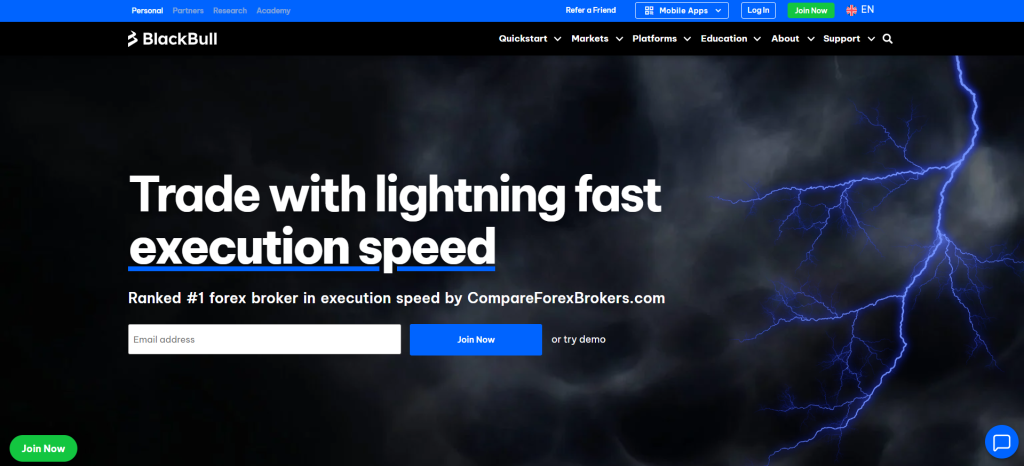
Frequently Asked Questions
What trading platforms does BlackBull Markets offer?
BlackBull Markets offers a wide range of platforms: MetaTrader 4 (MT4), MetaTrader 5 (MT5), cTrader, and integration with TradingView. They also provide their proprietary BlackBull CopyTrader for social trading and BlackBull Invest for share investing, catering to diverse trading styles.
Is BlackBull Markets good for beginners?
Yes, BlackBull Markets is generally suitable for beginners. They offer a Standard account with no minimum deposit, providing an accessible entry point. Their comprehensive Education Hub features tutorials, courses, and guides for various skill levels, alongside a free demo account for risk-free practice.
Pros and Cons
| ✓ Pros | ✕ Cons |
| FMA-regulated | Limited educational resources |
| True ECN execution | No proprietary trading platform |
| Tight spreads | Does not accept U.S. clients |
| High leverage | Withdrawal Fees |
| No minimum deposit | Inactivity Fee |
Final Score
| # | Criteria | Score |
| 1 | Overall Rating and Trust Score | ⭐⭐⭐⭐☆ |
| 2 | Range of Investments, Platforms and Tools | ⭐⭐⭐⭐☆ |
| 3 | Commissions, Fees, and Bonus Offers | ⭐⭐⭐⭐☆ |
| 4 | Research and Education | ⭐⭐⭐☆☆ |
| 5 | Mobile Trading and User Experience | ⭐⭐⭐⭐☆ |
| 6 | Customer Support and Regulatory Compliance | ⭐⭐⭐⭐☆ |
| 7 | Deposit and Withdrawal Option | ⭐⭐⭐⭐☆ |
| 8 | Execution Speed and Order Types | ⭐⭐⭐⭐☆ |
| 9 | Risk Management and Safety Measures | ⭐⭐⭐⭐☆ |
| 10 | Markets Analysis and Trading Tools | ⭐⭐⭐⭐☆ |
Our Insights
BlackBull Markets is a reliable, FMA-regulated broker based in New Zealand, offering ECN trading, competitive spreads, and access to MT4/MT5 platforms. It’s well-suited for both beginners and professionals, though lacks an investor compensation scheme.
2. CMC Markets
CMC Markets is a global forex and CFD broker regulated by the Financial Markets Authority (FMA) in New Zealand. Known for its powerful Next Generation platform, CMC offers competitive spreads, extensive asset coverage, and strong regulatory oversight for New Zealand clients.
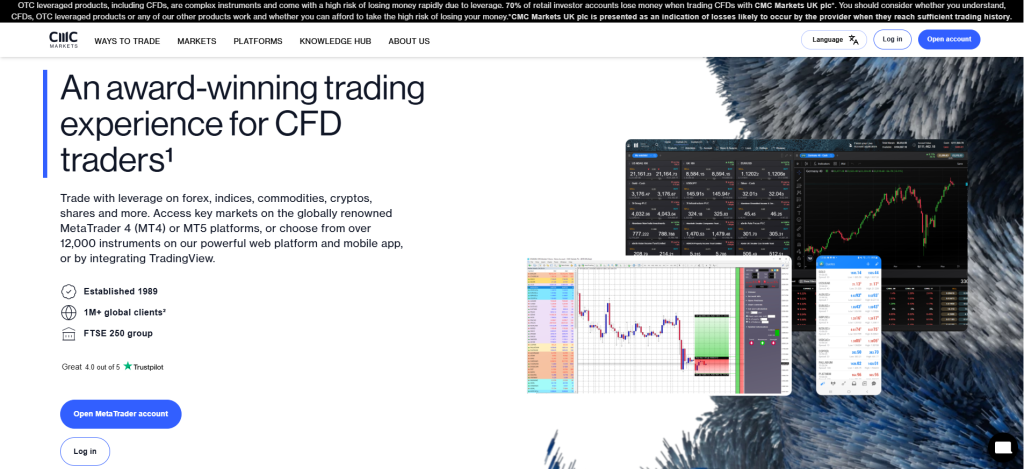
Frequently Asked Questions
Can I use a demo account?
Yes, CMC Markets offers a free demo account with virtual funds. You can use it to practice trading CFDs and forex on their award-winning Next Generation platform or MetaTrader 4 in a risk-free environment. Demo accounts generally do not expire.
Does CMC Markets offer negative balance protection?
Yes, CMC Markets offers negative balance protection for its retail clients. This is a regulatory requirement in regions like the UK and the EU, and it ensures that your losses from trading CFDs will not exceed the funds available in your account.
Pros and Cons
| ✓ Pros | ✕ Cons |
| Regulated globally | Limited support for MetaTrader |
| No minimum deposit | Inactivity Fees |
| Advanced proprietary platform | Higher Stock CFD Fees |
| Free demo account | No US Clients |
| Negative balance protection | Complex Fee Structure |
Final Score
| # | Criteria | Score |
| 1 | Overall Rating and Trust Score | ⭐⭐⭐⭐⭐ |
| 2 | Range of Investments, Platforms and Tools | ⭐⭐⭐⭐☆ |
| 3 | Commissions, Fees, and Bonus Offers | ⭐⭐⭐⭐☆ |
| 4 | Research and Education | ⭐⭐⭐⭐☆ |
| 5 | Mobile Trading and User Experience | ⭐⭐⭐⭐⭐ |
| 6 | Customer Support and Regulatory Compliance | ⭐⭐⭐⭐⭐ |
| 7 | Deposit and Withdrawal Option | ⭐⭐⭐⭐☆ |
| 8 | Execution Speed and Order Types | ⭐⭐⭐⭐☆ |
| 9 | Risk Management and Safety Measures | ⭐⭐⭐⭐⭐ |
| 10 | Markets Analysis and Trading Tools | ⭐⭐⭐⭐☆ |
Our Insights
CMC Markets is a well-established forex and CFD broker regulated in New Zealand by the FMA. It offers a wide range of trading instruments, advanced platforms, and competitive spreads, making it a reliable choice for Kiwi traders.
3. IG
IG is a globally regulated forex and CFD broker, authorized in New Zealand by the FMA. It offers a wide range of instruments, powerful trading platforms, and competitive spreads, catering to both beginner and advanced New Zealand traders.
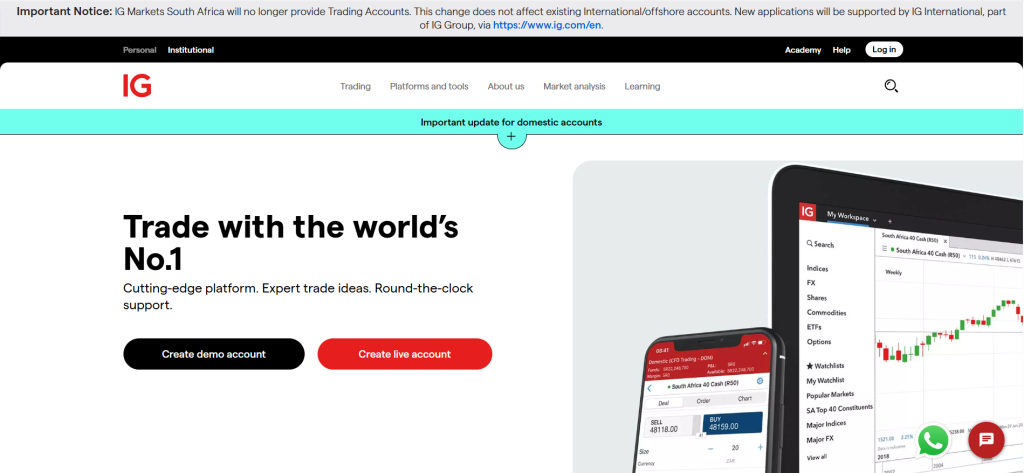
Frequently Asked Questions
What trading platforms does IG offer?
IG offers a diverse suite of trading platforms including their award-winning proprietary web and mobile platforms. They also support MetaTrader 4 (MT4) for forex specialists, ProRealTime for advanced charting, and L2 Dealer for direct market access (DMA) share trading.
Does IG charge commissions?
IG’s commission structure varies by asset. For forex and major indices/commodities CFDs, fees are typically built into the spread, meaning no separate commission. However, for share CFDs, IG generally charges a commission per trade, with a minimum fee applicable.
Pros and Cons
| ✓ Pros | ✕ Cons |
| Globally Regulated | Share CFD Commissions |
| Advanced Trading Platforms | Inactivity Fee |
| Strong Educational Resources | Complex Product Range |
| Negative Balance Protection | No Islamic Account |
Final Score
| # | Criteria | Score |
| 1 | Overall Rating and Trust Score | ⭐⭐⭐⭐⭐ |
| 2 | Range of Investments, Platforms and Tools | ⭐⭐⭐⭐⭐ |
| 3 | Commissions, Fees, and Bonus Offers | ⭐⭐⭐⭐☆ |
| 4 | Research and Education | ⭐⭐⭐⭐⭐ |
| 5 | Mobile Trading and User Experience | ⭐⭐⭐⭐⭐ |
| 6 | Customer Support and Regulatory Compliance | ⭐⭐⭐⭐⭐ |
| 7 | Deposit and Withdrawal Option | ⭐⭐⭐⭐☆ |
| 8 | Execution Speed and Order Types | ⭐⭐⭐⭐☆ |
| 9 | Risk Management and Safety Measures | ⭐⭐⭐⭐⭐ |
| 10 | Markets Analysis and Trading Tools | ⭐⭐⭐⭐⭐ |
Our Insights
IG is a globally trusted broker regulated by the FMA in New Zealand. It offers access to a wide range of markets, powerful platforms, and strong educational support, making it ideal for both beginner and experienced traders.
Top 3 Forex Brokers in New Zealand – BlackBull Markets vs CMC Markets vs IG
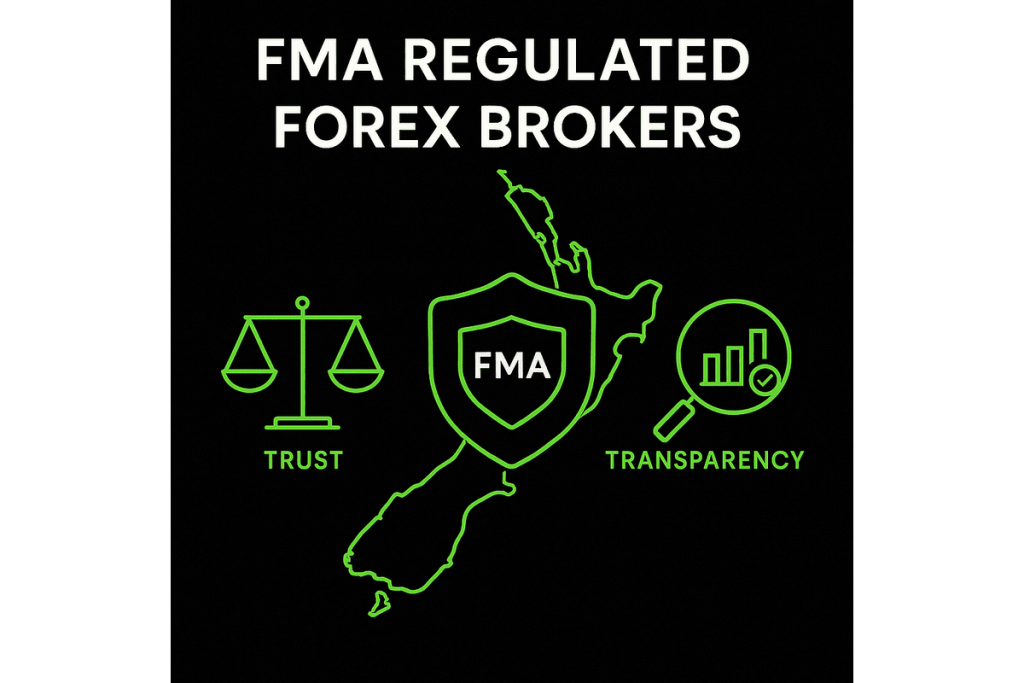
4. TMGM
TMGM is a New Zealand–licensed CFD and forex broker (FMA FSP 569807) offering fast ECN execution via MT4/MT5/IRESS, tight spreads from 0.0 pips, leverage up to 1:30 (NZ), NZD support, crypto trading, swap‑free (Islamic) accounts, negative balance protection, and segregated client funds.
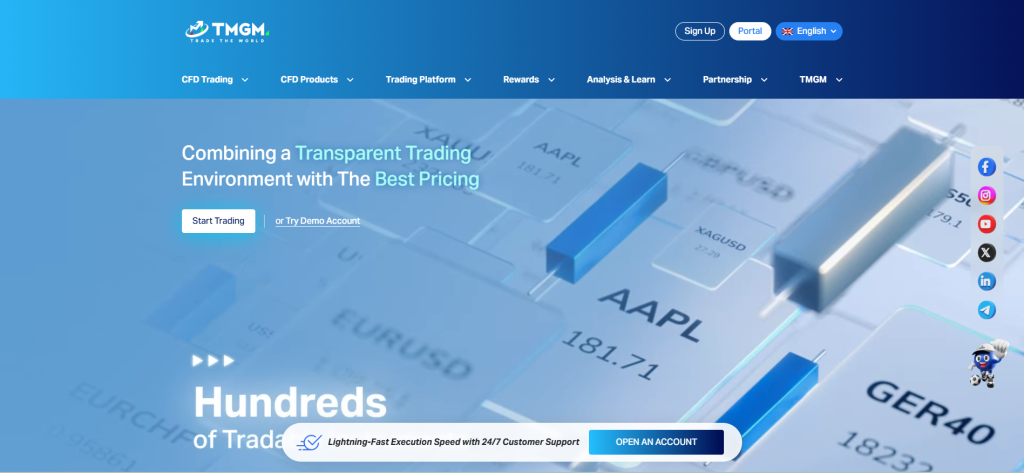
Frequently Asked Questions
What is TMGM’s leverage offering?
TMGM’s leverage offering varies based on the regulatory entity. For global clients, leverage can be as high as 1:1000. However, for clients under stricter regulations, leverage is capped at 1:30. This allows flexibility depending on your location and risk appetite.
Which trading platforms does TMGM offer?
TMGM offers the popular MetaTrader 4 and MetaTrader 5 platforms, available across desktop, web, and mobile. Additionally, they provide their proprietary TMGM Mobile App for on-the-go trading and management, and the HUBx platform for social and copy trading.
Pros and Cons
| ✓ Pros | ✕ Cons |
| Low minimum deposit | Limited educational content |
| Tight spreads | Inactivity fee |
| Fast execution via Equinix NY4 server | Crypto CFDs have reduced leverage |
| No deposit/withdrawal fees | Not available to U.S. clients |
| Wide CFD range | Swap fees apply |
Final Score
| # | Criteria | Score |
| 1. | Overall Rating and Trust Score | ⭐⭐⭐⭐☆ |
| 2. | Range of Investments, Platforms and Tools | ⭐⭐⭐☆☆ |
| 3. | Commissions, Fees, and Bonus Offers | ⭐⭐⭐⭐☆ |
| 4. | Research and Education | ⭐⭐☆☆☆ |
| 5. | Mobile Trading and User Experience | ⭐⭐⭐⭐☆ |
| 6. | Customer Support and Regulatory Compliance | ⭐⭐⭐☆☆ |
| 7. | Deposit and Withdrawal Option | ⭐⭐⭐⭐☆ |
| 8. | Execution Speed and Order Types | ⭐⭐⭐⭐⭐ |
| 9. | Risk Management and Safety Measures | ⭐⭐⭐⭐☆ |
| 10. | Markets Analysis and Trading Tools | ⭐⭐⭐☆☆ |
Our Insights
TMGM is a well-regulated broker offering low spreads, fast execution, and access to thousands of CFDs. It suits active and experienced traders, though beginners may find its limited educational resources and lack of proprietary tools a drawback.
5. AvaTrade
AvaTrade, a globally regulated forex and CFD broker founded in 2006, holds authorization from the Financial Markets Authority (FMA) in New Zealand, ensuring it complies with local financial laws.
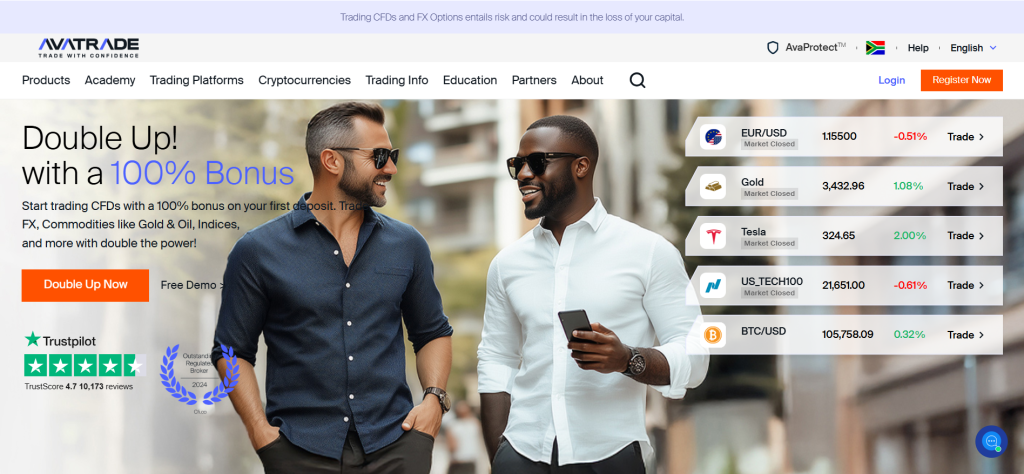
Frequently Asked Questions
Is AvaTrade safe for beginners?
Yes, AvaTrade is considered safe and suitable for beginners. They are a highly regulated broker with strong educational resources, including their AvaAcademy. Additionally, they offer a free demo account and user-friendly platforms like AvaTradeGO, making it easy to learn and practice risk-free.
Are funds kept in segregated accounts?
Yes, AvaTrade segregates client funds from its own operational capital. This means the broker holds your deposited money in separate bank accounts with reputable financial institutions, providing a crucial layer of security. This practice protects your funds.
Pros and Cons
| ✓ Pros | ✕ Cons |
| Globally regulated | No variable spread account types |
| Commission-free trading | Limited product range |
| Multiple platforms | Inactivity fee |
| Wide range of CFDs | Limited crypto leverage |
| Negative balance protection | No cent or micro accounts |
Final Score
| # | Criteria | Score |
| 1 | Overall Rating and Trust Score | ⭐⭐⭐⭐☆ |
| 2 | Range of Investments, Platforms and Tools | ⭐⭐⭐⭐☆ |
| 3 | Commissions, Fees, and Bonus Offers | ⭐⭐⭐⭐☆ |
| 4 | Research and Education | ⭐⭐⭐⭐☆ |
| 5 | Mobile Trading and User Experience | ⭐⭐⭐⭐⭐ |
| 6 | Customer Support and Regulatory Compliance | ⭐⭐⭐⭐⭐ |
| 7 | Deposit and Withdrawal Option | ⭐⭐⭐⭐☆ |
| 8 | Execution Speed and Order Types | ⭐⭐⭐⭐☆ |
| 9 | Risk Management and Safety Measures | ⭐⭐⭐⭐⭐ |
| 10 | Markets Analysis and Trading Tools | ⭐⭐⭐⭐☆ |
Our Insights
AvaTrade is a well-regulated forex and CFD broker offering commission-free trading, robust platforms, and strong client protections. It’s ideal for beginners and experienced traders alike, though inactivity fees and limited crypto leverage may be drawbacks for some.
6. Interactive Brokers
Interactive Brokers, a globally recognized brokerage firm, offers access to stocks, forex, options, futures, and more. It registers with the Financial Markets Authority (FMA) in New Zealand, which provides regulatory oversight for local clients.
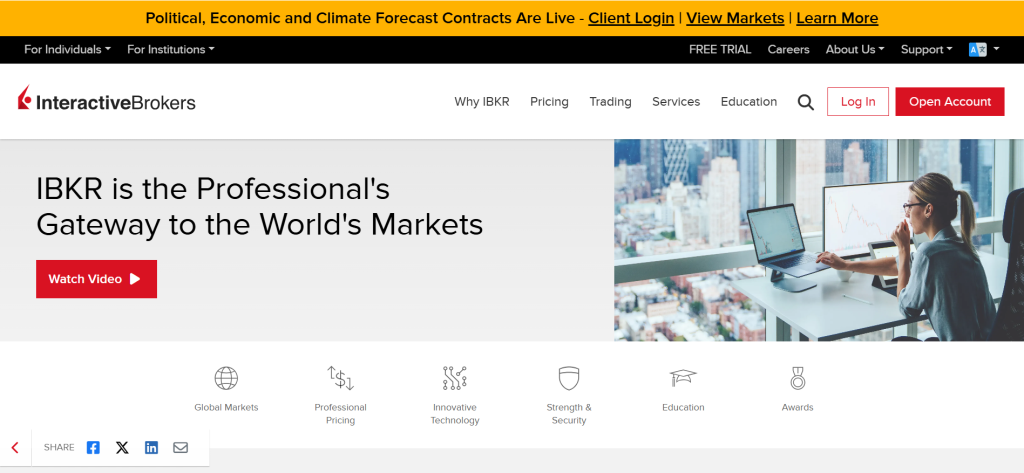
Frequently Asked Questions
What is the minimum deposit to open an account?
Interactive Brokers generally has no minimum deposit to open a Cash Account for most entities. However, there may be minimum equity balance requirements for certain account types, such as Margin accounts. Some specific programs or non-US entities may have different requirements.
Is IBKR suitable for beginners?
Interactive Brokers can be challenging for absolute beginners due to its vast features and the advanced Trader Workstation (TWS). However, they offer simpler platforms like Client Portal, IBKR GlobalTrader, and IBKR Desktop which are more beginner-friendly.
Pros and Cons
| ✓ Pros | ✕ Cons |
| Globally regulated | Complex platforms |
| Access to 150+ markets | No Islamic (swap-free) accounts |
| Extremely low commissions | Limited free research tools |
| Advanced trading tools | No credit card or e wallet funding options |
Final Score
| # | Criteria | Score |
| 1 | Overall Rating and Trust Score | ⭐⭐⭐⭐⭐ |
| 2 | Range of Investments, Platforms and Tools | ⭐⭐⭐⭐⭐ |
| 3 | Commissions, Fees, and Bonus Offers | ⭐⭐⭐⭐☆ |
| 4 | Research and Education | ⭐⭐⭐⭐☆ |
| 5 | Mobile Trading and User Experience | ⭐⭐⭐☆☆ |
| 6 | Customer Support and Regulatory Compliance | ⭐⭐⭐⭐☆ |
| 7 | Deposit and Withdrawal Option | ⭐⭐⭐☆☆ |
| 8 | Execution Speed and Order Types | ⭐⭐⭐⭐⭐ |
| 9 | Risk Management and Safety Measures | ⭐⭐⭐⭐☆ |
| 10 | Markets Analysis and Trading Tools | ⭐⭐⭐⭐⭐ |
Our Insights
Interactive Brokers is a leading global brokerage firm offering direct access to over 160 markets and 28 currencies. Known for low costs, advanced technology, and broad multi-asset trading, it serves millions of clients worldwide with strong regulatory compliance.
7. Plus500
Plus500 is a leading global CFD broker regulated in New Zealand by the Financial Markets Authority (FMA) through Plus500AU Pty Ltd. The platform offers commission-free trading on forex, stocks, indices, commodities, ETFs, and cryptocurrencies.

Frequently Asked Questions
What trading platforms does Plus500 offer?
Plus500 primarily offers its proprietary WebTrader platform, accessible via web browser and dedicated mobile apps (iOS and Android). This platform is known for its user-friendliness and intuitive design. For U.S. clients, Plus500 also offers a separate Futures trading platform.
Can I open a demo account before funding?
Yes, Plus500 offers a free and unlimited demo account that you can open before funding. This allows you to practice CFD trading with virtual funds, explore their proprietary WebTrader platform, and test strategies in real market conditions without any financial risk.
Pros and Cons
| ✓ Pros | ✕ Cons |
| FMA regulated | No MetaTrader support |
| Commission-free trading | No Islamic (swap-free) accounts |
| Simple, user-friendly platform | Limited educational resources |
| Wide range of CFD | No copy trading or social trading features |
Final Score
| # | Criteria | Score |
| 1 | Overall Rating and Trust Score | ⭐⭐⭐⭐☆ |
| 2 | Range of Investments, Platforms and Tools | ⭐⭐⭐⭐☆ |
| 3 | Commissions, Fees, and Bonus Offers | ⭐⭐⭐⭐☆ |
| 4 | Research and Education | ⭐⭐☆☆☆ |
| 5 | Mobile Trading and User Experience | ⭐⭐⭐⭐☆ |
| 6 | Customer Support and Regulatory Compliance | ⭐⭐⭐⭐☆ |
| 7 | Deposit and Withdrawal Option | ⭐⭐⭐⭐☆ |
| 8 | Execution Speed and Order Types | ⭐⭐⭐☆☆ |
| 9 | Risk Management and Safety Measures | ⭐⭐⭐⭐☆ |
| 10 | Markets Analysis and Trading Tools | ⭐⭐☆☆☆ |
Our Insights
Plus500 is a well-regulated, user-friendly CFD broker offering commission-free trading and strong safety features like negative balance protection. It’s ideal for beginners, though its lack of advanced tools, MetaTrader support, and limited asset ownership may deter professionals.
8. HFM
HFM, is a multi-asset forex and CFD broker offering trading on forex, commodities, indices, shares, and crypto. It operates globally and is regulated in New Zealand by the Financial Markets Authority (FMA) under HF Markets (New Zealand) Ltd.
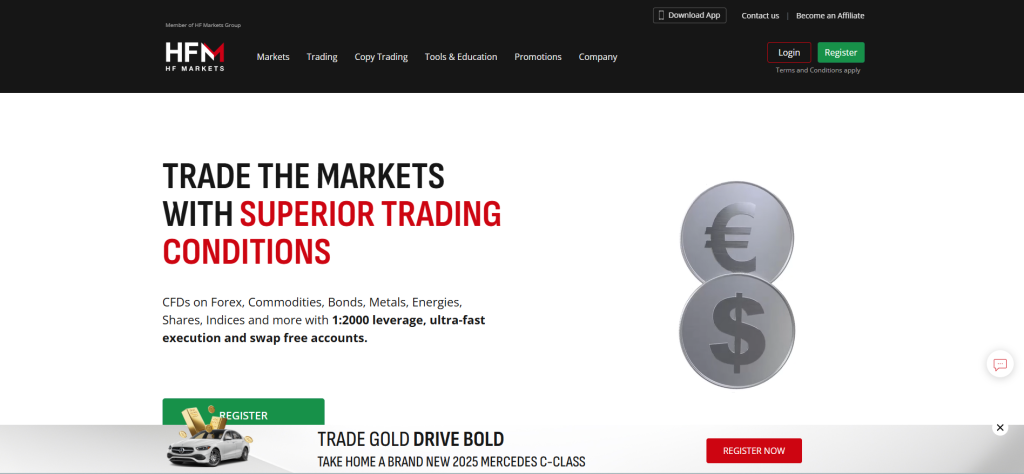
Frequently Asked Questions
What is the minimum deposit to open an account?
HFM offers various account types with different minimum deposit requirements. For some accounts like the Cent, Zero, and Premium accounts, there is no minimum deposit. However, for others like the Pro Account, a minimum deposit of $100 USD is typically required.
What platforms does HFM support?
HFM supports the popular MetaTrader 4 (MT4) and MetaTrader 5 (MT5) platforms, available on desktop, web, and mobile. They also offer their proprietary HFM Platform via their mobile app, providing comprehensive trading options across various devices.
Pros and Cons
| ✓ Pros | ✕ Cons |
| Regulated in New Zealand | Commissions apply |
| Low minimum deposit | No fixed spread accounts |
| Supports MT4, MT5, and HFM App | Limited educational content |
| Wide range of CFDs | No desktop app for proprietary platform |
| Negative balance protection | Leverage can be risky for beginners |
Final Score
| # | Criteria | Score |
| 1 | Overall Rating and Trust Score | ⭐⭐⭐⭐☆ |
| 2 | Range of Investments, Platforms and Tools | ⭐⭐⭐⭐☆ |
| 3 | Commissions, Fees, and Bonus Offers | ⭐⭐⭐⭐☆ |
| 4 | Research and Education | ⭐⭐⭐⭐☆ |
| 5 | Mobile Trading and User Experience | ⭐⭐⭐⭐☆ |
| 6 | Customer Support and Regulatory Compliance | ⭐⭐⭐☆☆ |
| 7 | Deposit and Withdrawal Option | ⭐⭐⭐⭐⭐ |
| 8 | Execution Speed and Order Types | ⭐⭐⭐⭐☆ |
| 9 | Risk Management and Safety Measures | ⭐⭐⭐⭐☆ |
| 10 | Markets Analysis and Trading Tools | ⭐⭐⭐⭐☆ |
Our Insights
HFM offers a well-regulated, beginner-friendly trading environment with low deposits, diverse CFDs, and strong safety features. It’s a great option for New Zealand traders, though advanced users may find platform tools somewhat limited.
9. Axi
Axi is a global forex and CFD broker regulated in New Zealand by the Financial Markets Authority (FMA) under AxiCorp Financial Services Pty Ltd. It offers trading on forex, commodities, indices, and cryptocurrencies with access to MetaTrader 4.
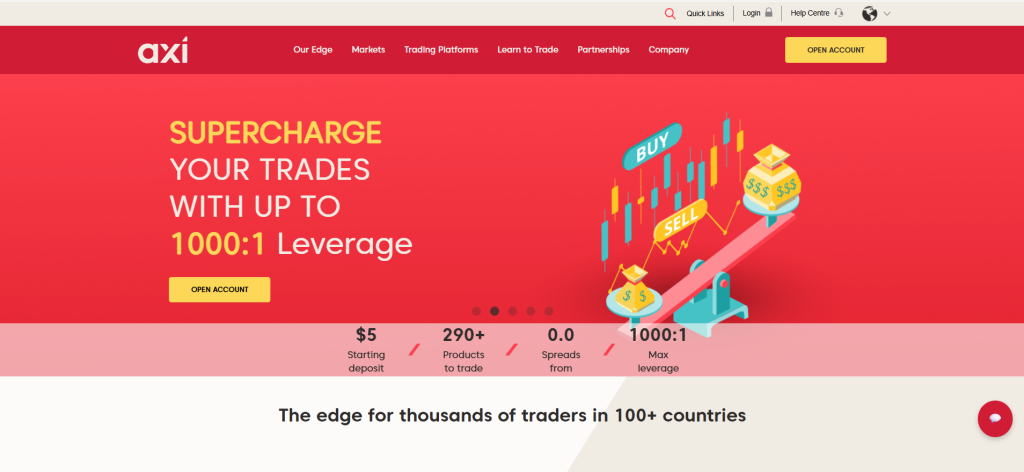
Frequently Asked Questions
Does Axi offer swap-free (Islamic) accounts?
Yes, Axi offers dedicated Islamic accounts for Muslim traders, designed to comply with Sharia law. These accounts eliminate overnight swap fees. However, it’s important to note that a holding fee may be applied to eligible symbols held open beyond a 5-calendar-day grace period.
Is there a demo account available?
Yes, Axi offers a free demo account with virtual funds. It allows you to practice trading in a simulated live environment using MT4, with real-time spreads and execution. While initial access is usually for 30 days, it can become.
Pros and Cons
| ✓ Pros | ✕ Cons |
| Regulated in New Zealand | Limited product range |
| No minimum deposit | No proprietary platform |
| Spreads from 0.0 pips on Pro account | Commission applies |
| Supports MetaTrader 4 | No social or copy trading features |
| Islamic (swap-free) accounts | Leverage can be risky for beginners |
Final Score
| # | Criteria | Score |
| 1 | Overall Rating and Trust Score | ⭐⭐⭐⭐☆ |
| 2 | Range of Investments, Platforms and Tools | ⭐⭐⭐⭐☆ |
| 3 | Commissions, Fees, and Bonus Offers | ⭐⭐⭐⭐☆ |
| 4 | Research and Education | ⭐⭐⭐⭐☆ |
| 5 | Mobile Trading and User Experience | ⭐⭐⭐⭐☆ |
| 6 | Customer Support and Regulatory Compliance | ⭐⭐⭐⭐⭐ |
| 7 | Deposit and Withdrawal Option | ⭐⭐⭐⭐☆ |
| 8 | Execution Speed and Order Types | ⭐⭐⭐⭐☆ |
| 9 | Risk Management and Safety Measures | ⭐⭐⭐⭐⭐ |
| 10 | Markets Analysis and Trading Tools | ⭐⭐⭐⭐☆ |
Our Insights
Axi is a reliable, FMA-regulated broker in New Zealand offering low-cost MT4 trading, strong safety features, and no minimum deposit. While ideal for cost-conscious traders, it lacks advanced platforms and extensive CFD variety.
10. OANDA
OANDA accepts traders from New Zealand. Residents can open an account and access a wide range of forex and CFD instruments, including NZD currency pairs.

Frequently Asked Questions
What is the minimum deposit at OANDA?
OANDA offers no minimum deposit requirement to open or maintain a trading account for most of its entities. While you can open an account with any amount, you will need sufficient funds to open positions and engage in actual trading activities.
Is negative balance protection available?
Yes, OANDA generally offers negative balance protection for its retail clients. This crucial feature ensures that your losses from trading cannot exceed the funds available in your account, protecting you from accruing a debt to the broker.
Pros and Cons
| ✓ Pros | ✕ Cons |
| Highly Regulated | Limited Product Range |
| No Minimum Deposit | No FMA Regulation (NZ) |
| User-Friendly Platforms | Variable Leverage |
| Strong Educational Resources | Commission on Core Accounts |
| Fast Execution | MT5 Not Supported |
Final Score
| # | Criteria | Score |
| 1 | Overall Rating and Trust Score | ⭐⭐⭐⭐☆ |
| 2 | Range of Investments, Platforms and Tools | ⭐⭐⭐☆☆ |
| 3 | Commissions, Fees, and Bonus Offers | ⭐⭐⭐☆☆ |
| 4 | Research and Education | ⭐⭐⭐⭐☆ |
| 5 | Mobile Trading and User Experience | ⭐⭐⭐⭐☆ |
| 6 | Customer Support and Regulatory Compliance | ⭐⭐⭐⭐⭐ |
| 7 | Deposit and Withdrawal Option | ⭐⭐⭐⭐☆ |
| 8 | Execution Speed and Order Types | ⭐⭐⭐⭐☆ |
| 9 | Risk Management and Safety Measures | ⭐⭐⭐⭐⭐ |
| 10 | Markets Analysis and Trading Tools | ⭐⭐⭐⭐☆ |
Our Insights
OANDA is a trusted, well-regulated broker offering user-friendly platforms, competitive pricing, and strong educational tools. It’s ideal for forex and CFD traders, though it lacks FMA regulation and broader asset variety.
Is Forex Trading Legal and Popular in New Zealand?
Forex trading is legal and popular in New Zealand. The Financial Markets Authority (FMA) regulates brokers and financial service providers to ensure compliance and protect investors.
Many New Zealanders engage in forex trading due to easy access to online platforms and competitive market conditions.
Criteria for Choosing a Forex Broker in New Zealand
| Criteria | Description | Importance |
| FMA Regulation | Ensure the broker is licensed or registered with the Financial Markets Authority (FMA) for legal protection. | ⭐⭐⭐⭐⭐ |
| Trading Costs | Look for tight spreads and low commissions to minimize trading expenses. | ⭐⭐⭐⭐☆ |
| Account Types | A variety of account options (e.g., Standard, ECN, Islamic) to suit different trader needs. | ⭐⭐⭐☆☆ |
| Deposit & Withdrawal Methods | Convenient, fast, and secure funding options including NZD support. | ⭐⭐⭐⭐☆ |
| Leverage & Margin | Check the leverage offered—regulated brokers in NZ typically limit leverage for retail traders (e.g., 1:30). | ⭐⭐⭐⭐☆ |
| Trading Platforms | Availability of reliable platforms like MetaTrader 4/5, mobile apps, and web based tools. | ⭐⭐⭐⭐⭐ |
| Asset Variety | Access to forex pairs, indices, commodities, and cryptos for diversified trading. | ⭐⭐⭐⭐☆ |
| Customer Support | Local or 24/5 multilingual support with fast response times. | ⭐⭐⭐⭐☆ |
| Educational Resources | Training materials, webinars, and tools to support beginner traders. | ⭐⭐⭐☆☆ |
| Reputation & Security | Broker’s history, client reviews, and fund segregation practices. | ⭐⭐⭐⭐⭐ |
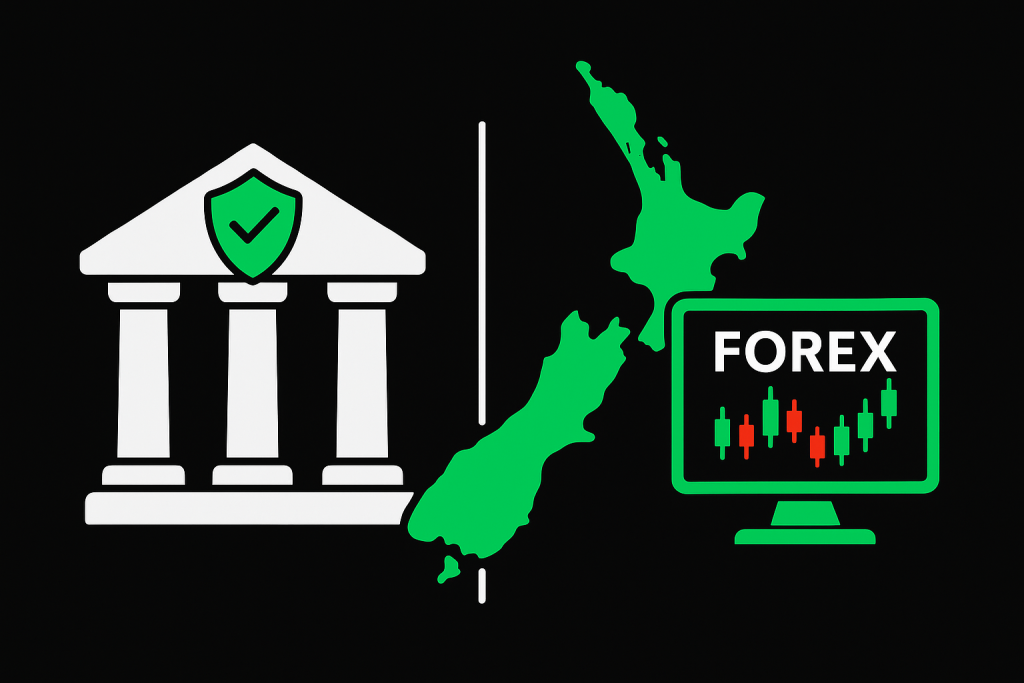
What Real Kiwi Traders Want to Know
Q: How important is it for a forex broker to be FMA-regulated in New Zealand? – Anya Sharma, New Zealand
Q: What are the typical leverage limits for retail forex traders with FMA-regulated brokers? – Ben Taylor, New Zealand
Q: Do FMA-regulated forex brokers offer negative balance protection? – Chloe Davis, New Zealand
Q: Is my money protected by an investor compensation scheme with FMA-regulated brokers? – Daniel Lee, New Zealand
Q: Which well-known forex brokers are regulated by the FMA in New Zealand? – Emma Brown, New Zealand
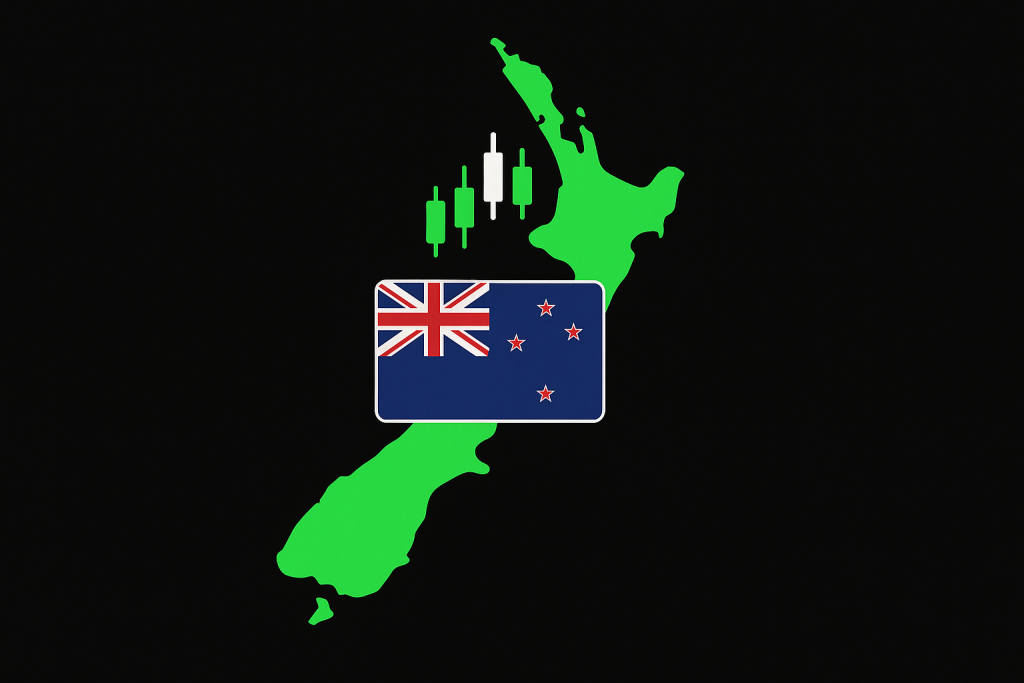
In Conclusion
Forex trading in New Zealand is growing steadily, supported by strong FMA regulation that ensures trader protection and transparency. With access to reputable brokers and high leverage options, Kiwi traders enjoy a secure yet dynamic trading environment.
You Might also Like:
Faq
Yes, most FMA-regulated brokers that cater to the New Zealand market will offer NZD as a base currency for your trading account. This is a common feature, allowing you to avoid currency conversion fees when depositing and withdrawing.
FMA-regulated brokers commonly offer popular platforms like MetaTrader 4 (MT4) and MetaTrader 5 (MT5). Many also provide their own proprietary web and mobile trading platforms, often with advanced charting and analysis tools.
The FMA’s oversight primarily covers traditional financial derivatives like forex and CFDs. While some brokers may offer crypto CFDs, the FMA has expressed concerns about their suitability for retail investors and leverage limits are very low
First, you should raise your complaint directly with the broker through their formal complaints process. If the issue remains unresolved, you can then escalate your complaint to the Financial Services Complaints Limited (FSCL), which is an independent dispute resolution scheme in NZ.
Yes, forex trading profits are generally considered income for tax purposes in New Zealand and are subject to income tax. There are no specific forex-only tax rules; traders are obligated to report and pay taxes on their trading income like any other earned income.



















